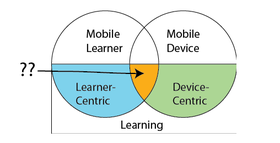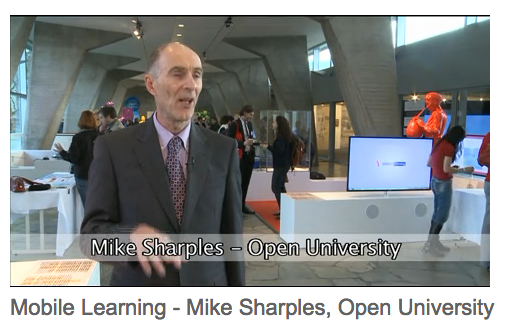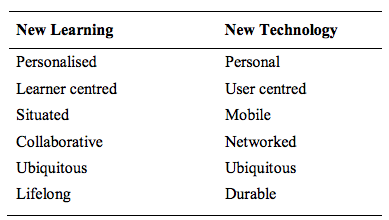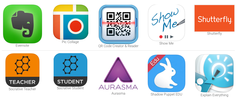7.1 Mobile and LearningThis week we will focus on the following outcomes. You will:
Focus Question
|
|
We'll begin by viewing this video from TedXLondon - Geoff Stead Mobile Learning
As you watch, consider these questions:
- What are some characteristics of mobile learning?
- How does mobile technology shift teaching and learning?
Making Meaning in Mobile Environments
|
"There is a need to re-conceptualise learning for the mobile age,
to recognise the essential role of mobility and communication in the process of learning, and also to indicate the importance of context in establishing meaning, and the transformative effect of digital networks in supporting virtual communities that transcend barriers of age and culture." Towards a Theory of Mobile Learning, Sharples, M., Taylor, J., & Vavoula, G. 2005 |
|
With this understanding, that mobile technologies will continue to transform learning, it is critical to examine how, where, when and, most importantly WHY technology is integrated into teaching and learning landscapes. With this ever-evolving and ever-changing set of tools and resources, how can educators manage mobile technology in their classrooms?
How might learning and teaching shift to new ways of knowing? Let's take a look at some favourite or familiar mobile technologies impacting education and examine the WHY? Why use them and why do they shift learning? |

In her article "An inclusive definition of mobile learning" Rebecca J. Hogue presents an image of mobile learning that integrates the learner with the device. She asks what the intersection of learner centric and device centric should be called. Where does the learning truly take place? How can educators ensure that the device does not pull the learner off center?
Mobile learning is expanding educational opportunities around the world. UNESCO holds and annual Mobile Learning Week (2018 sessions are listed here) in efforts to support the growing need for conversations about mobile learning.
Opportunities for teacher development and empowering women, disenfranchised and impoverished populations are some of the reasons mobile learning is a growing area of research.
We have more computing power in our pockets than NASA had for the moon landing - learn more from this article about Francois Taddei.
Working on the UNESCO Sustainable Development Goals (Teach SDGs) is one way to integrate mobile, inquiry learning into your classrooms.
Planning and participating in Citizen Science projects is another great inquiry based way to make learning mobile friendly.
Opportunities for teacher development and empowering women, disenfranchised and impoverished populations are some of the reasons mobile learning is a growing area of research.
We have more computing power in our pockets than NASA had for the moon landing - learn more from this article about Francois Taddei.
Working on the UNESCO Sustainable Development Goals (Teach SDGs) is one way to integrate mobile, inquiry learning into your classrooms.
Planning and participating in Citizen Science projects is another great inquiry based way to make learning mobile friendly.
Connecting MOBILE Media to your teaching
Lets connect the idea of mobility to forms of assessment - shifting how you know students have acquired 'knowledge' and can demonstrate their learning. Google Forms is one tool/resource that can support the mobile shift in assessment.
|
|
|
Take some time to create a simple Google Form to share with others in this class or at Lakehead. Post the form to your blog site. Invite others to take your 'survey' so you have some results to review. How can students use Google Forms to survey and reach out to others when building knowledge -
Taking time to tinker with another mobile technology - REMIND. Read more about this communication tool from the Remind BLOG. Learn more from the REMIND YouTube playlist.
|
|
|
|
Link to learn more about some apps used by educators. Links to other great lists of apps for educators. Also check out EdShelf where apps are reviewed by users for users. Follow EdShelf on Twitter.
|
Reflect and Connect:
Questions to ponder-
Questions to ponder-
- How do mobile technologies change how students can engage in media and digital technologies?
- Why are literacy lessons essential when mobile tools are used in the classroom?
Resources/Links:
- 10 apps for Math Fluency, Monica Burns, Edutopia (some are listed as FREE, others have fees attached)
- Teach with your iPhone: Apps to use in the classroom, Monica Burns, Edutopia
- 5 Apps for making movies on Mobile Devices, Monica Burns, Edutopia - includes info on iMotionHD, PicPlayPost, Magisto (Android), iMovie, Andromedia Video Editor (Android)
- Mobile Learning Support for New Teachers, Lisa Dabbs, Edutopia
- Tips and Tricks for Managing Devices in the Classroom, Darri Stephens, Common Sense Media



